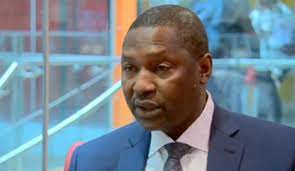
The Federal Government on Friday reconstituted the National Committee Against Torture(NCAT). The committee is headed by the Solicitor-General of the Federation, Beatrice Jedy-Agba, while the Executive Secretary, National Human Rights Commission (NHRC) Tony Ojukwu, SAN is the alternate Chair of the committee. The secretariat will be domiciled at the National Human Rights Commission (NHRC)
The committee’s Terms of Reference include engaging with the Committee Against Torture (CAT) and regional human rights mechanisms in the context of country reporting, facilitation of visits by special procedure mandate holders or the Subcommittees on the Prevention of Torture; facilitating the preparation of reports to CAT and regional human rights mechanisms, as well as responding to communication, follow up questions and recommendations or decisions received from such mechanisms.
Speaking during the inauguration, the Attorney-General of the Federation, Abubakar Malami, SAN said members are expected to play a crucial role in stamping out torture and other related vices and ensuring justice for survivors and victims.
He said the last Committee was unable to establish proper official communication or engagement with the International Body UNCAT and the new committee has been empowered to liaise with the NHRC in discharging its mandate, especially in the area of visits to Correctional Service facilities.
Members of the Committee are drawn from the Federal Ministry of Justice, Civil society organisations, Nigerian Bar Association, DSS, National Human Right Commission, Nigeria Police Force, EFCC, Legal Aids Council, and Nigeria Correctional Service among others.
Speaking to NOHR, one of the representatives of the Civil Society in the committee, Barrister Deji Ajare, described the reconstitution of the Committee as a welcome development and long overdue. “The rejiggering, hopefully, will put it in a better position to meet its mandates, particularly those that will ensure that there is accountability for perpetrators of torture. Access to Justice is excited to be a part of the Committee as it will only be an expansion of the platform for us to continue with the work we have been doing over the years to reduce the use of torture amongst law enforcement agencies.” said Ajare.
Torture is routine and widespread among security agencies in Nigeria. In March 2007, the UN Special Rapporteur on torture and other cruel, inhuman, and degrading treatment and punishment, Manfred Nowak, visited Nigeria and confirmed that: “torture and ill-treatment are widespread in police custody and particularly systematic in criminal investigations departments’ and that “Torture is an intrinsic part of how the police operate within the country.”
Nigeria is a state party to several regional and international human rights mechanisms that prohibit the use of torture and other ill-treatment. These include the International Covenant on Civil and Political Rights (ICCPR); the Convention against Torture (CAT) and its Optional Protocol (OPCAT); the International Convention for the Protection of All Persons from Enforced Disappearance; and the African Charter on Human and Peoples’ Rights. Nigeria has also signed and ratified the Convention on the Elimination of all forms of Discrimination against Women (CEDAW) and the Convention on the Rights of the Child (CRC).
On 27 July 2009, Nigeria launched the National Committee Against Torture (NCAT), headed by Professor Sanni Ameh, as part of its obligation to set up national preventive mechanisms after signing and ratifying the Convention Against Torture(CAT) and OPCAT. The committee was reportedly starved of funding and never operated effectively. The former committee was also not legally or operationally independent.
In December 2017, President Buhari signed the Anti-torture Act 2017 to fill the existing legislative gaps by explicitly making the right to freedom from torture, cruel, inhuman, and degrading treatment a non-derogable right, criminalizing torture, and protecting victims and witnesses of torture.





